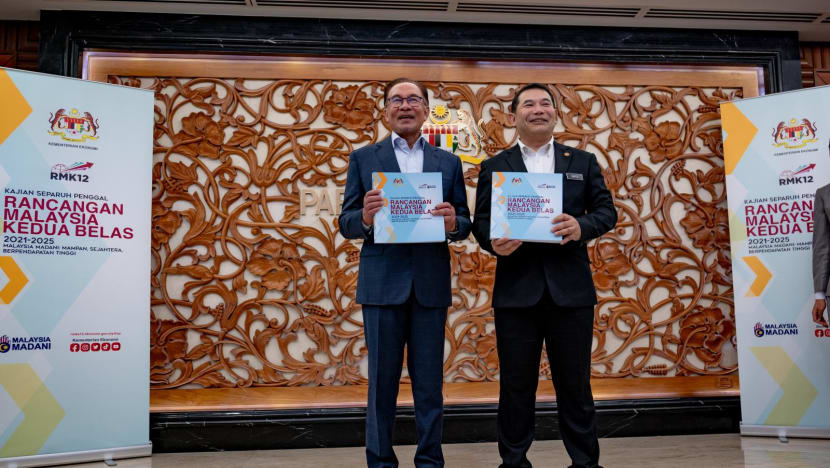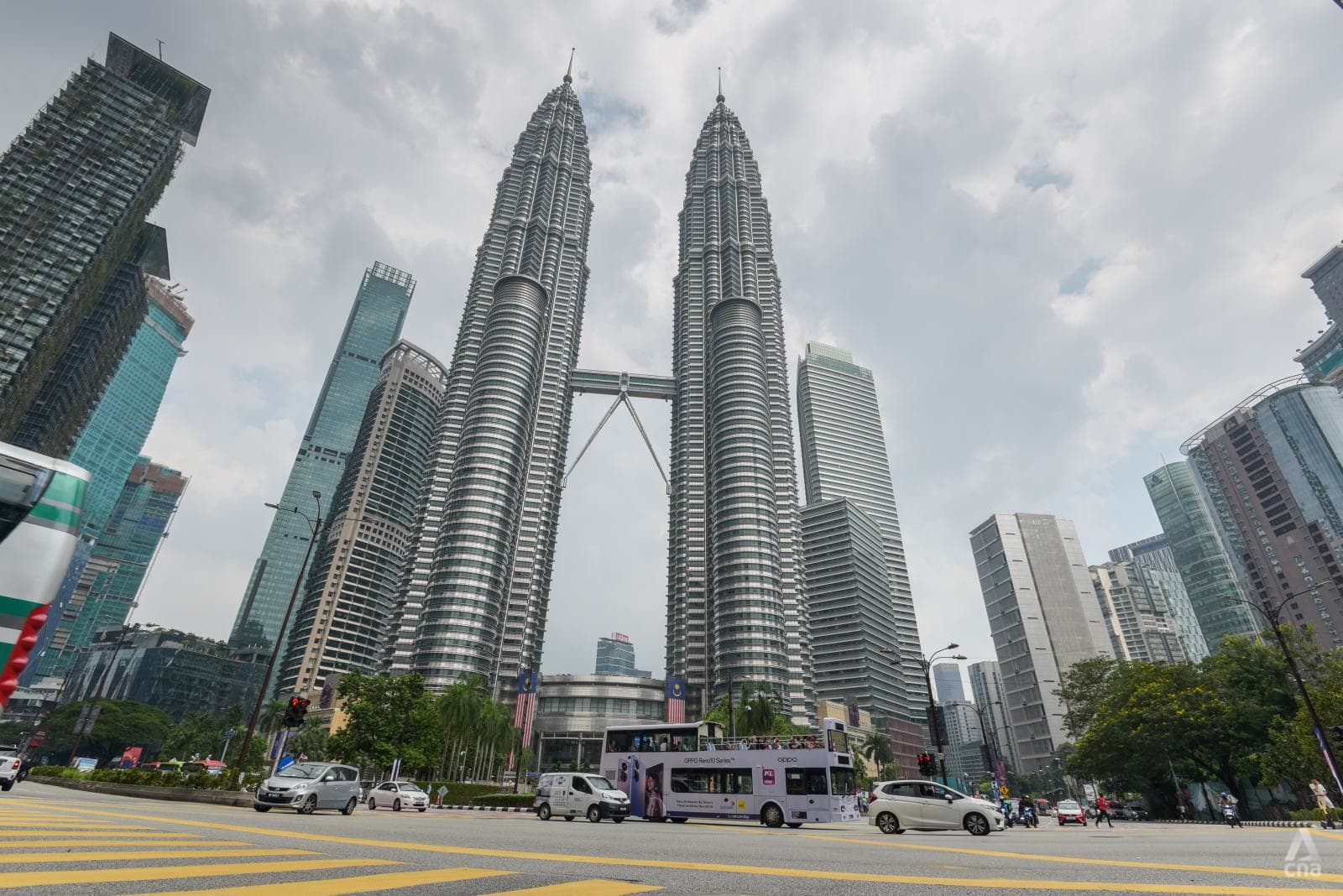Analysis: Malaysia PM Anwar's government faces challenges in attempting economic reforms
Economic measures proposed by the Malaysian government led by Mr Anwar Ibrahim are badly needed but will be challenging to pull off, say observers.

Malaysian Prime Minister Anwar Ibrahim and Economics Affairs Minister Rafizi Ramli after the tabling of the mid-term reivew of the 12th Malaysia Plan (12MP) at parliament on Sep 11, 2023. (Photo: Prime Minister’s Office of Malaysia/Afiq Hambali)
KUALA LUMPUR: Certain economic policy shifts announced by Malaysian Prime Minister Anwar Ibrahim during the mid-term review of the 12th Malaysia Plan (12MP) will be challenging to pull off and may have wider political implications on the current unity government’s standing, analysts say.
During the tabling of the 12MP review in parliament on Monday (Sep 11), Mr Anwar said that the government would be looking at implementing targeted subsidies as well as ways to expand the country’s tax base, among a slew of other things.
The Malaysia Plan is an outline of government development policies for a five-year period. The first plan was introduced in 1965 and covered the development agenda from 1966 to 1970.
Malaysia is in the midst of its 12th plan, which runs from 2021 to 2025. It was first tabled in Oct 2021 by the government led by previous prime minister Ismail Sabri Yaakob.
A mid-term review is conducted for every plan and debated in parliament.
Economics Affairs Minister Rafizi Ramli told reporters after the latest review that the government was also not ruling out the reintroduction of the Goods and Services Tax (GST) and that they were looking at the implementation of a capital gains tax.
Mr Anwar had earlier this year floated the proposal of a capital gains tax during the re-tabling of Budget 2023, his first since he took office in November last year. Mr Anwar is also Malaysia’s finance minister.
Political analysts whom CNA spoke to said that while the measures are politically risky for Mr Anwar and his government, they were necessary for the country to implement now at a time when the world was undergoing an economic slowdown.
RETARGETING OF SUBSIDIES
Mr Anwar said on Monday that the 12MP will be realigned with the Madani Economy Framework that aims to empower and rejuvenate Malaysia’s economy over a period of ten years. The framework was launched in July of this year.
An allocation of RM400 billion (US$85.56 billion) was initially set aside for the 12MP but Mr Anwar said that another RM15 billion will be added to it, bringing the total allocation for the government’s five-year development plan to RM415 billion.
He noted that 34 per cent of the initial RM400 billion had been spent in the first two years - RM64.3 billion in 2021 and a further RM71.6 billion last year.
In his speech on Monday, Mr Anwar said that there would be a restructuring of electricity, diesel, and petrol subsidies as well as social assistance to ensure more prudent fiscal management of the funds.
“We guarantee that the lower income groups will be given priority and will be helped,” he said.
Analysts, however, believe that the targeted subsidies would be difficult to implement. This is especially so as everyone - regardless of their economic status - currently enjoys broad-based subsidies for petrol and electricity, among other things.
“I think it is a very complicated issue and won’t be easy to implement. While the B40 (Bottom 40 per cent income group) and M40 (Middle 40 per cent income group) might gain from it, but the T20 (Top 20 per cent income group) who also pay taxes will be disappointed with the move. I believe it could have political repercussions. This will be considered an unpopular move,” political analyst Dr Jeniri Amir of the National Professors Council told CNA.
Currently, RON95 petrol costs RM2.05 per litre in Malaysia, the second lowest price in Southeast Asia behind Brunei. The sale of the RON95 petrol is reserved for all Malaysian-registered vehicles.
Motorists of foreign-registered vehicles are only allowed to purchase the unsubsidised RON97 petrol, which is currently priced at RM3.37 per litre.
Nusantara Academy for Strategic Research senior fellow Dr Azmi Hassan said that the price of fuel was a “very sensitive subject” in the country and that the price of goods was closely related to fuel prices.
“Right now, everyone is enjoying the subsidy and I am not sure how the government will want to implement this. I believe that it will take very long to formulate it,” he told CNA.
Mr Rafizi said during the press conference on Monday that the targeted subsidy programme was expected to be launched next year.
Earlier in February, Malaysian Deputy Finance Minister Ahmad Maslan said that out of the RM50.8 billion spent by the government on petrol, diesel and liquified petroleum gas (LPG) subsidies last year, 35 per cent had been benefited by the T20 group.
He said that the B40 group accounted for only 24 per cent, while the M40 group used 41 per cent of the subsidies.
Besides fuel, foodstuff such as rice, cooking oil, flour and chicken as well as transportation and water are also subsidised by the government.
For example, prices for eggs and chicken in the market are controlled by the government. In the peninsula, the current retail price ceiling for a standard chicken is RM9.40 per kg while prices for eggs differ according to their grades.

REINTRODUCTION OF GST?
Mr Anwar also said that measures would be taken to expand the tax base, diversify tax sources and improve the administration of taxation through the use of technology.
He, however, claimed that the government serves the people and it would “never” burden them with taxes that were beyond their means.
“The principle we adopt is fair economic equality for the well-being of all people,” he said, without giving more details.
Mr Rafizi, the economic affairs minister, said on Monday that the government is open to reintroducing GST to expand the tax revenue base to achieve fiscal sustainability.
He said that while there were no immediate plans for the GST for now, the government is focused on developing and rolling out the capital gains tax next year.
"We’re willing to explore different methods to achieve this fiscal sustainability through a wider revenue base,” he was quoted as saying by news portal Malaysiakini.
The capital gains tax is a tax on the profit that an investor makes when they sell an investment such as stocks, bonds, and real estate.
In tabling Malaysia’s 2023 budget, Mr Anwar had said that the government was studying how to introduce a capital gains tax for unlisted share disposal by companies.
Mr Anwar then later said that the tax would not be introduced on listed shares while the disposal of unlisted shares for an approved initial public offering would also not be subject to the tax.
Separately, political analyst Dr Sivamurugan Pandian of Universiti Sains Malaysia (USM) said that the GST issue for one had been manipulated by the then-opposition during the 2018 elections and was one of the reasons that led to the downfall of the Barisan Nasional government led by Najib Razak at the time.
“It was easily manipulated by the opposition, some of whom are in the government now. It is a high risk undertaking politically but I think these are rational measures to ensure we remain competitive regionally and globally,” he told CNA.
The GST was first introduced in April 2015 during the administration of Najib Razak at a rate of 6 per cent, although the tax was not imposed on several things such as basic food items, agricultural products, water, fuel and several services.
When Pakatan Harapan won the elections in May 2018, the GST was removed and replaced with the Sales and Services Tax (SST) three months later.
Many economists consider GST - a consumption based tax - to be the most transparent tax system and broadens the tax base as compared to the SST, which brings in less revenue.
Mr Ahmad Maslan had told parliament in March that the average annual amount collected under SST was RM25 billion, while the government could collect RM50 billion should the GST be implemented.
Dr Jeniri said it would be very challenging for the current Malaysian government to reintroduce the GST and they would have to swallow its pride if it decided to do so.
“I don’t think it will be easy for people to accept it now. That is the problem with political leaders who use populism to win votes. They rejected the GST before so how are they going to explain any decision to reimplement it,” he said.
Both Dr Jeniri and Dr Sivamurugan, however, said that while the measures were set to be unpopular, they were needed for the long-term benefit of the country.
“At the bottom line, they have to explain all these moves to the people properly. The GST was considered to be a solid initiative and any future political leaders should think carefully before they change policies which are good for the country overnight,” said Dr Jeniri.
“These measures are needed to overcome the economic challenges now but before you implement them you have to make sure that the masses understand why these measures are necessary and that it doesn’t backfire on the government,” said Dr Sivamurugan.
MEASURES TAKEN SHOW GOVERNMENT TRYING TO KEEP FISCAL DEFICIT IN CHECK: ECONOMISTS
Economists told CNA that the measures undertaken by Mr Anwar’s government were seen as efforts to rejuvenate the economy at a time when global economic uncertainties have heightened.
Bank Muamalat Malaysia chief economist Mohd Afzanizam Abdul Rashid said the plans to raise revenue via capital gains tax and that the retargeting of the subsidies showed the government was putting an effort to keep the fiscal deficits in check.
Dr Afzanizam, however, pointed out that he has yet to see a mechanism on the targeted subsidies.
“For now, it seems they want to ensure they have a robust database which I suppose will help them to identify the rightful recipients of such financial aid,” he told CNA.
Economist Lee Heng Guie of the Socio-Economic Research Centre (SERC) believed that the mechanism of the targeted subsidies would be presented during Budget 2024 that will be tabled on Oct 13 this year.
“The government’s fiscal management is very important because they need to convince the people that they have the source of money, other than borrowings.
“Their income is from a narrow source of income, but they have a lot of commitments. If they don’t look at new revenue streams, they will be forever trapped in debt,” he said, adding that there was still a lack of clarity on the measures that the government wanted to take.




















